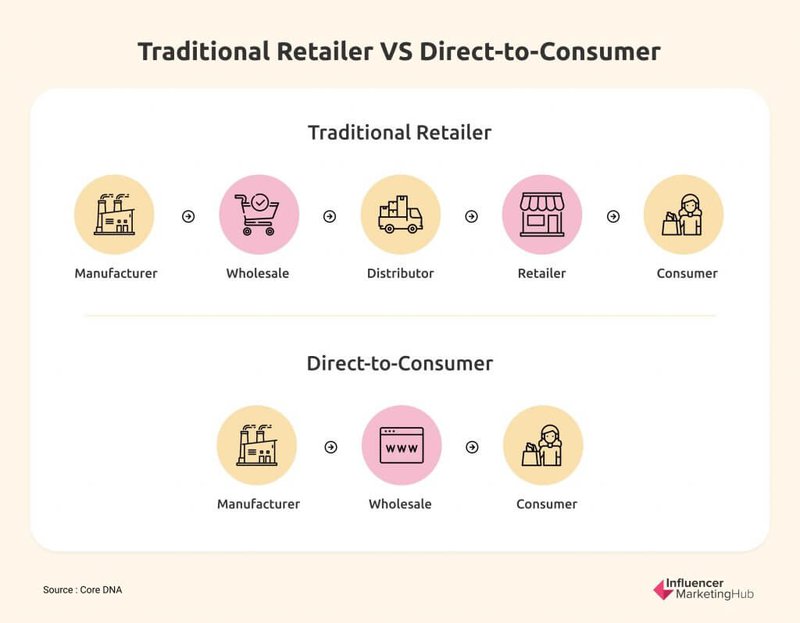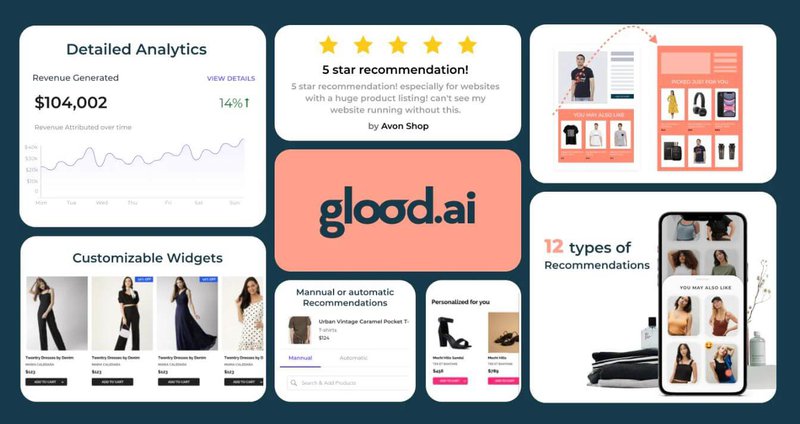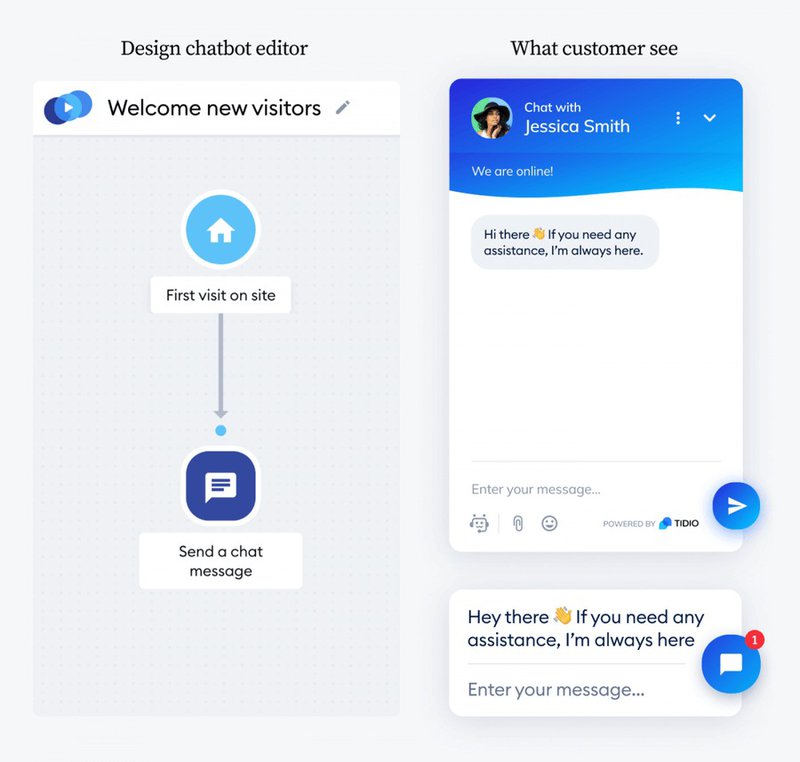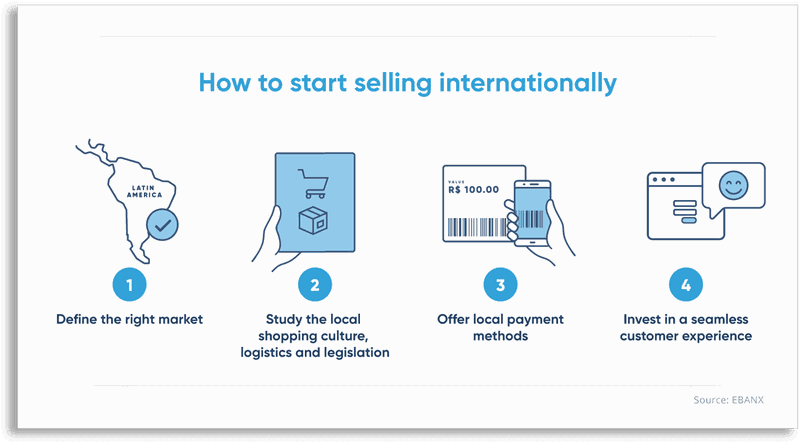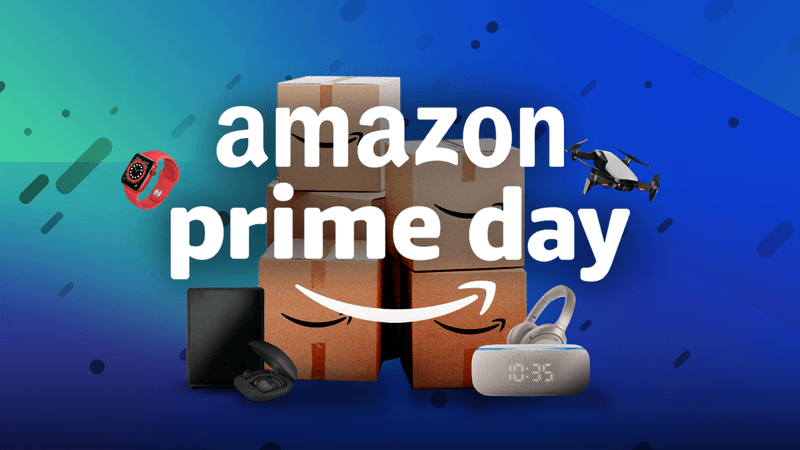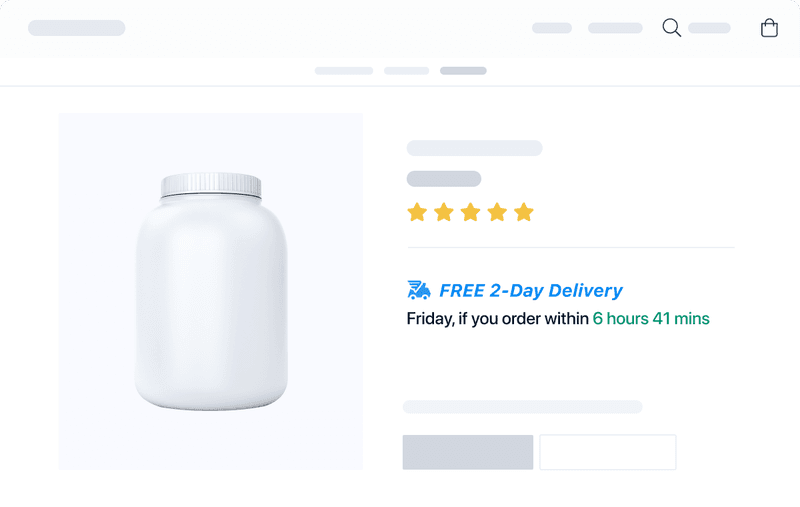Perfecting the DTC eCommerce Experience - How to Get It Right in 2025
Here's how the top DTC brands create that stellar eCommerce experience and etch their name in history + examples + best practices + expert tips.
Updated November 6, 2024.

Ecommerce brands have been through a lot of ups and downs in the last few years. We had the pandemic, then the inflation, and while many experts predicted eCommerce to boom, consumers were joyously returning to brick-and-mortar stores.
The brands in the toughest spot were DTC companies, and even though we’ve seen a lot of them bust, the eCommerce direct-to-consumer trend continues to win shoppers' hearts and minds.
In this article, we explore what DTC eCommerce is, the benefits it offers, examples of successful DTC brands, and strategies they use to overcome common challenges and stay on top.
What is Direct-to-Consumer?
Direct-to-consumer (DTC) refers to the business model where brands sell their products directly to customers without relying on third-party retailers. In this model, companies maintain complete control over the customer experience, from marketing and sales to order fulfillment and customer support.
DTC eCommerce is primarily conducted through online platforms and third-party marketplaces, allowing brands to bypass traditional retail channels and establish a direct connection with their target audience.
Benefits of DTC eCommerce
DTC eCommerce offers numerous advantages for consumer brands looking to make a mark in the competitive digital landscape. Let's explore some key benefits:
Compete with retail brands
DTC allows smaller brands to compete with retail giants by leveraging their unique value proposition and cultivating a distinct brand identity.
Direct-to-consumer (DTC) eCommerce has leveled the playing field for smaller brands, empowering them to compete with retail giants in ways that were once unimaginable. By embracing the DTC model, these consumer brands can leverage their unique value propositions and cultivate a distinct brand identity that resonates with their target audience.
Unlike traditional retail channels that often prioritize established brands, DTC allows smaller players to shine and connect with consumers on a more personal level.
Tell a compelling brand story
One of the key advantages of DTC is the ability to tell a compelling brand story. Smaller brands can craft a narrative that communicates their mission, values, and the problem they're trying to solve. This storytelling approach creates an emotional connection with consumers, fostering trust and loyalty.
DTC also enables brands to take full control over their marketing and messaging, allowing them to showcase their unique selling points, highlight product features, and differentiate themselves from the competition. They can do this through various touchpoints, such as social media, email marketing, SMS marketing, live chat, and other digital channels.
DTC brands can continuously improve their products, services, and overall customer experience by actively listening to their customers' feedback, preferences, and pain points. This agility and responsiveness give them a competitive edge over retail giants that may struggle to adapt quickly to changing consumer demands.
Customize the customer experience
Brands have the unique opportunity to understand their customers on a deeper level and deliver personalized experiences that cater to individual preferences and needs. By collecting and analyzing first-party data, DTC brands can gather valuable insights to tailor the shopping experience from start to finish.
- Tailored product recommendations - By utilizing data on previous purchases, browsing history, and customer preferences, brands can offer personalized suggestions that align with each customer's tastes. It enhances the shopping experience and increases the chances of cross-selling and upselling, boosting overall sales and customer satisfaction.
- Personalized marketing campaigns - Delivering relevant content, promotions, and recommendations to specific customer segments through segmentation and targeting strategies. This approach ensures that customers receive messages that resonate with their interests and preferences, increasing the likelihood of engagement and conversions.
- Leverage customer feedback and interactions to provide exceptional customer service. By addressing individual concerns, resolving issues promptly, and showing genuine care for their customers, brands can create a personalized support experience that fosters customer loyalty and advocacy.
This high level of customization sets eCommerce companies apart from retail giants that often struggle to deliver personalized experiences due to their size and operational complexities. And it helps them boost customer retention by building lasting relationships with customers.
Pro tip: another great way to personalize the customer experience is through email. Check out our guide on the best email retention strategies.
Build a loyal following
DTC brands can foster strong relationships, build brand loyalty, and create a community of passionate advocates by directly engaging with customers.
Unlike traditional retail channels, where brands may have limited interaction with customers, DTC allows for direct and continuous engagement. Brands can communicate with customers through various touchpoints, including social media platforms, email newsletters, and live chats.
These interactions create a sense of connection and accessibility, making customers feel valued and heard.
To foster a loyal following, DTC brands can also leverage community-building strategies. This involves creating platforms or spaces where customers can engage with one another, share experiences, and offer recommendations. Customers who feel part of a community are more likely to remain loyal and actively promote the brand to others.
Get more data on your customers
DTC brands have access to valuable customer data, enabling them to gain insights into consumer preferences, behavior, and purchasing patterns, which can inform marketing strategies and product development.
- Marketing strategies - consumer brands can use insights into customers' demographics, interests, and purchasing habits to segment their customer base and deliver highly personalized marketing messages
- Product development - data analysis can reveal which products or categories are most popular, allowing brands to optimize their product offerings and inventory management accordingly.
- Customer preferences - pricing, packaging, and shipping options, enabling brands to align their strategies with customer expectations.
- Customer journey - It can also highlight areas of improvement in the customer journey, enabling brands to optimize their website, checkout process, and other areas of the marketing funnel.
The wealth of customer data available to DTC brands offers a competitive advantage in today's digital landscape. By harnessing this data and leveraging insights to inform their strategies, DTC brands can make informed decisions, deliver personalized experiences, and stay ahead of the curve.
Expand globally with minimal overhead
One of the significant advantages of the DTC eCommerce model is its potential for global expansion with minimal overhead costs. Unlike traditional retail stores, which require setting up physical stores or distribution channels in different locations, DTC brands can reach shoppers worldwide with a well-optimized online presence.
DTC eCommerce eliminates the need for costly retail space, allowing brands to allocate resources to improve the online shopping experience, marketing efforts, and product development. This cost-effectiveness enables brands to enter new markets more swiftly and efficiently.
With the right fulfillment and distribution strategies, brands can ensure seamless order processing, inventory management, and shipping across different time zones and borders. This accessibility to a global customer base unlocks significant growth opportunities, especially in emerging markets where traditional retail presence may be limited or non-existent.
10 Examples of DTC Brands That Are Rocking It
Here are some of the coolest DTC brands and some of the marketing strategies they used to create an unforgettable experience for their loyal customers.
1. Warby Parker
Warby Parker revolutionized the eyewear industry by offering affordable, stylish glasses directly to consumers through their website. They provide a virtual try-on feature and a home try-on program, ensuring a seamless and convenient shopping experience.
2. Allbirds
Allbirds gained popularity with the world's first shoe made out of bamboo. They focus on direct sales, offering a straightforward online shopping experience and emphasizing their commitment to environmentally friendly practices. They started with UGC + influencers out of the gate and have grown to over $240M in value.
3. Casper
Casper disrupted the mattress industry by offering high-quality mattresses directly to people's homes. They provide a risk-free trial period, an easy ordering process, and excellent support to enhance the overall experience.
4. Dollar Shave Club
Dollar Shave Club delivers razors and grooming products directly to consumers through a subscription-based model. They prioritize convenience, affordability, and personalized recommendations based on individual grooming needs.
5. Rothy's
Rothy's offers sustainable and stylish shoes made from recycled plastic bottles. They emphasize comfort, versatility, and a seamless online shopping experience.
6. Away
Away specializes in travel essentials, including suitcases and bags. They provide durable, well-designed products and focus on exceptional customer service, with features like a 100-day trial and a lifetime warranty.
7. Harry's
Harry's disrupted the shaving industry by offering high-quality razors and grooming products directly to consumers. They prioritize affordability, customization, and an easy-to-navigate online store. It was acquired in 2021 for $1.37 billion by a consumer brand corporation.
8. Glossier
Glossier has built a cult-like following by offering beauty and skincare products that cater to their customers' needs. They focus on creating a community-driven brand and prioritize customer feedback and engagement. Their success came from brilliant content marketing efforts - interviewing celebrities about their favorite makeup products.
9. Native
Native is known for its natural and aluminum-free deodorants. They emphasize simplicity, transparency, and personalized recommendations to provide customers with an excellent online shopping experience.
10. Nectar
Nectar is a mattress brand that provides premium quality mattresses directly to consumers. They offer a risk-free trial, hassle-free returns, and exceptional customer service to ensure customer satisfaction.
DTC challenges to work through
While DTC eCommerce offers numerous benefits, brands must also navigate certain challenges. Let's explore a few common challenges and strategies to overcome them.
Shipping and fulfillment
Timely and efficient order fulfillment is crucial for a positive customer experience. DTC brands must establish reliable shipping processes and partnerships to ensure prompt delivery and minimize shipping costs. Some brands choose to use Amazon FBA for preferred channels to be able to offer 1-2 day delivery. Others use third-party fulfillment (3PL) companies and use their distribution network.
Competition
The DTC space is becoming increasingly crowded, requiring brands to differentiate themselves through unique value propositions, compelling branding, and exceptional customer service. Consumer products require a lot of time to build and get into the mind of the shopper. Digitally native brands need to create a lot more content than traditional brands on social media channels, via email marketing, and online ads.
Customer service
Direct customer interactions place greater emphasis on providing outstanding customer service. Brands must invest in responsive support channels, handle inquiries promptly, and resolve issues effectively to build trust and loyalty. The name of the game is the customer lifetime value, eCommerce brands that don't have to dish out thousands of dollars on ads to stay profitable win.
Want to learn how to put your customer first? Check out our customer-first marketing guide.
10 Ways DTC Brands Succeed
We've spoken about the challenges. Let's cover some of the best tactics modern brands use to get a leg up on their competition.
1. Talk to your customers
Actively engage with customers through surveys, feedback forms, and social media interactions to understand their preferences, pain points, and expectations. Use this insight to refine your product offerings and marketing strategies.
2. Diversify your marketing mix
Leverage a mix of digital marketing channels, including social media, influencer collaborations, content marketing, and paid advertising, to reach a broader audience and maximize brand exposure. Create user-generated content (UGC), post it on various platforms, and use it for your online marketplace listings.
3. Build a retention strategy
Focus on building long-term customer relationships by implementing loyalty programs, personalized email marketing campaigns, and exclusive offers for repeat customers. Starbucks owned much of its success to its incredible loyalty and rewards program. In 2022 they had over 28.7 million users and a 16% year-over-year growth.
4. Expand to online marketplaces
Extend your reach by leveraging popular online marketplaces like Amazon, eBay, or Etsy. This allows you to tap into existing customer bases and benefit from their established infrastructure. There are tons of ways you could benefit from these marketplaces, including:
- Ads - most marketplaces have native ads that help to target customers
- SEO + listing optimization - show up on top in organic listings
- Established customer relationships - your shoppers already trust the platform
- Steady sales channel - you can expect a steady flow of eCommerce sales
- Preference over legacy brands - these platforms prefer the underdog
- Better experiences for customers - the platform does all the marketing, all you have to do is make sure you have a good product
- Traffic spillover - a lot of these shoppers choose to purchase directly on the individual brand's site
5. Capitalize on partnerships
Collaborate with complementary brands or influencers to reach new audiences, co-create content, or launch joint campaigns. Strategic partnerships can amplify your brand's visibility and attract new customers.
6. Offer multiple shipping and payment options
Provide customers with flexibility and convenience by offering a variety of shipping methods and secure payment options that align with their preferences. We're talking - Google Pay, Apple Pay, and Paypal - as well as Buy Now Pay Later apps like Klarna and Affirm.
7. Gather customer reviews
Encourage customers to leave reviews and testimonials on your website and external platforms. Positive reviews serve as social proof and can influence potential customers' purchase decisions.
8. Offer Fast Shipping
In the age of instant gratification, fast and reliable shipping is crucial. Consider expedited shipping options or partnerships with eCommerce logistics providers to ensure timely delivery.
9. Create an Easy Return Policy
Simplify the returns process by offering hassle-free returns and exchanges. A customer-friendly return policy builds trust and encourages repeat purchases.
Take your DTC experience to the next level
As we venture into 2024, direct-to-consumer (DTC) eCommerce continues reshaping the retail landscape. By leveraging the benefits of DTC, brands can compete with retail giants, customize the customer experience, build loyalty, gain valuable data insights, and expand globally.
By studying successful examples, addressing challenges, and implementing effective strategies, brands can perfect the DTC eCommerce experience and thrive in the ever-evolving digital marketplace.
Want to improve your DTC marketing game? Grow your online sales? Successfully expand to new channels? You need to work with a top eCommerce expert with proven experience in your niche and a successful track record. We've got the right one for you. Click here to get started.

